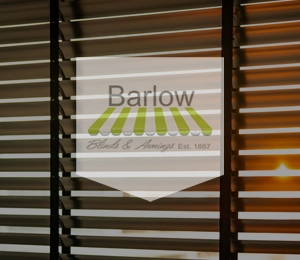Are blinds better than curtains? This is one question I get asked a lot and one that I think I should answer fairly for those who need a breakdown of the pros and cons of each. Now I need to be a little careful as we don’t sell curtains, but I will try and be as unbiased as possible. While the blinds vs. curtains debate usually always boils down to a matter of personal preference, there are certainly pros and cons to both that we can explore.
The very latest blinds combine the two. Our Allusion Blind is the perfect solution combining the luxurious look and feel of curtains with the practicality of a vertical blind
Curtains have been around for hundreds of years and a grand set of curtains draped from a rail can add a luxurious finish to any room. Their thick material is perfect for blocking any drafts from windows, keeping your room nice and cosy in the comforts of your own home. They also make a room look less bare as their lavishness can form a feature adding character to a room.
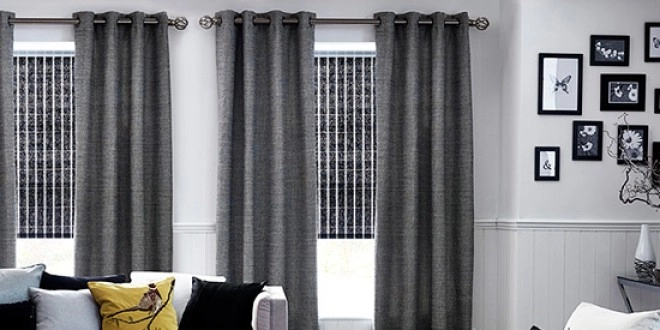
Buying them with blackout linings works very well for bedrooms as there are very few light gaps when comparing them to certain types of blinds. Curtains also come in a variety of styles, thicknesses, fabrics and colours – like blinds – but the fabric options in particular, and the colour and texture of these fabrics used to make curtains are a popular choice with interior design fanatics as they can match to a colour scheme or theme. However, with the advancement of blind technology and designs, there are now many fabrics and colours available to fulfil the same benefit – but the textures available are still one feature where curtains have more options. Both colours used well however can give the room a striking, sophisticated look, such as below:
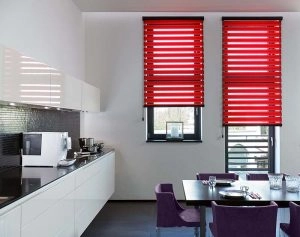
For curtains though, there are a host of styles, lining options and fabrics to change the overall aesthetic of the room. Light, sheer curtains are suitable for an airy atmosphere in a Scandinavian setting; while heavier, rich fabrics like velvet are better suited for cosy settings.
This is purely dependent on the kind of fabric you opt for, but curtains are usually pretty affordable. Cotton ones come for as little as £10 whilst other thicker curtains can go up a few thousand pounds. Thicker curtains can also make the room feel smaller as they take up more space compared to blinds but usually create a luxurious feel.
Thermal-backed curtains are a good energy-efficient option for areas that have extreme climates.
One conversation I had with a customer was about energy saving in the winter, and blinds vs. curtains on this issue. The problem he had was when he closed his curtains to keep the heat in, they covered the radiator and all the heat went straight out of the window.
In terms of durability, blinds are likely more durable being made of wood versus cloth curtains, since material that can become moth-eaten, stained or mouldy – as you can imagine, curtains in bathrooms and kitchens have a huge risk of mould and stains because of the constant moisture in the air.
Price-wise from what I’ve learnt over the years is that a good set of made-to-measure curtains does carry more of a premium than a made-to-measure blind, but the price weighs heavily on the material used.
TO SUMMARISE: CURTAINS PROS AND CONS
CURTAINS PROS
- Lots of colours and designs are available
- More textures available
- Different thickness options (eg. sheer curtains or thick, heavy, thermal-backed curtains)
- Can offer good energy saving as fewer gaps
- Can get cheap blinds, depending on the need
- Good for creating a particular atmosphere in interior design
- Blackout curtains are better for blocking out light
CURTAINS CONS
- Not as durable as blinds
- Made-to-measure curtains more expensive than made-to-measure blinds
- Most are not suitable for bathrooms/kitchens
- Can reduce energy savings if covering radiators
- Can’t filter in light; must be either open or closed
- Can become mouldy, stained or moth-eaten
- Harder to clean
Blinds offer completely different benefits and with so many different designs available, you’ll be guaranteed to find one that suits your style and your decor.
Blinds are more practical and functional with the ability to filter the amount of light that enters the room. Vertical blinds and Venetian blinds are fantastic at being able to filter the light, whilst still providing a good level of privacy. Many more modern homes are also now opting for blinds due to the ease of maintenance.
Another thing we are seeing more is people who have both at the same window. The blinds are used to control the light and the curtains are there purely to dress the window and never actually get moved, or are only closed at night to provide extra insulation and better block the morning light.

If you’re still in two minds whether to go for blinds or curtains, then Roman Blinds like ours could be the answer. Made from curtain fabric it is classed as a soft furnishing but with the practicalities of a blind. This way, you can match the fabric with your other furnishings; while still enjoying the basic functionality that blinds boast.
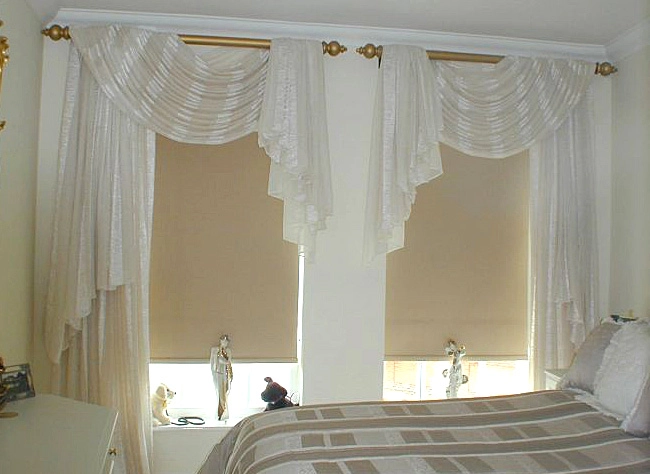
Blinds are particularly useful in kitchens, because of light and ease of cleaning. While they do collect dust rather quickly, a quick vacuum is easier to execute as opposed to putting curtains in the wash. You can also look for a wipe-clean fabric that is easier to manage. People with allergies might have an issue here.
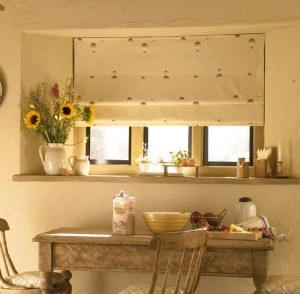
Blinds can also be fitted to the window exactly, so offer great energy efficiency without the potential of cutting off heating sources such as covering radiators. Even opened, Venetian blinds still offer a barrier against the cold or heat, giving you more energy savings all through the day.
TO SUMMARISE: BLINDS PROS AND CONS
BLINDS PROS
- Lots of colours and designs are available
- Different slat size and thickness options (eg. lined Roman blinds)
- Can offer good energy saving fitted to the window
- Cheaper than made-to-measure curtains
- Cleaner, more minimal interior design feel
- More durable than curtains
- Can be used anywhere in home
- Can filter in light
- Easier to clean and maintain
BLINDS CONS
- Not as good at completely blocking out light
- Not as many textures available (but still a good range)
- Slat blinds aren’t as good energy savers (eg. Venetian, vertical)
Whilst today we’ve discussed in detail some of the primary factors in the massive curtains vs. blinds debate, it is hard to say whether blinds are better than curtains as a whole because it all comes down to what you prefer in your home and what you need. Often, we see that a combination of both fits the home perfectly. Consider what you require and like the look of, and whether energy savings are a huge factor for you and you will one or the other stands out quite quickly.
Perhaps you could opt for blinds in spaces like kitchens and bathrooms, and perhaps enjoy both the plush feel of curtains and light-controlling blinds in your living rooms and bedrooms! To view some of the blinds we offer, check out our domestic blinds page here or for those who are interested in energy-efficient blinds, take a look at our our Duette energy-saving blinds.

About Phil Coleman
Phil Coleman is the fifth generation of his family to run Barlow Blinds, a Leicester business that has been making blinds since 1887. With over 30 years of hands-on experience, Phil has played a leading role in shaping industry standards including being part of the team that wrote the only NVQ qualification for blind and shutter installers. He also serves on the Management Committee of the British Blind & Shutter Association (BBSA), helping to set best practice across the trade. Under his leadership, Barlow Blinds has remained true to its founding principle: “It’s not our job to find customers for our blinds, it’s our job to find the right blinds for our customers.”

